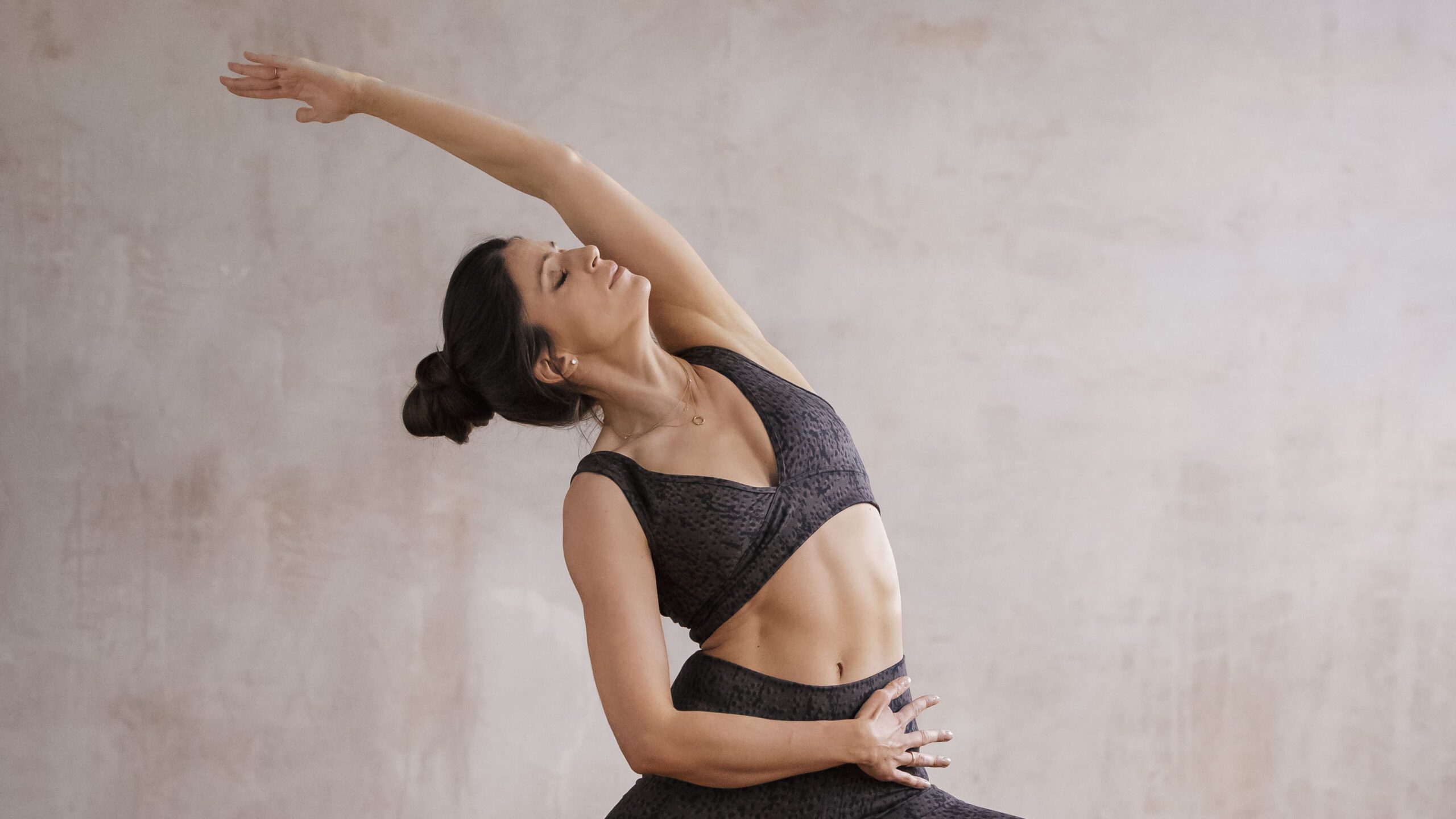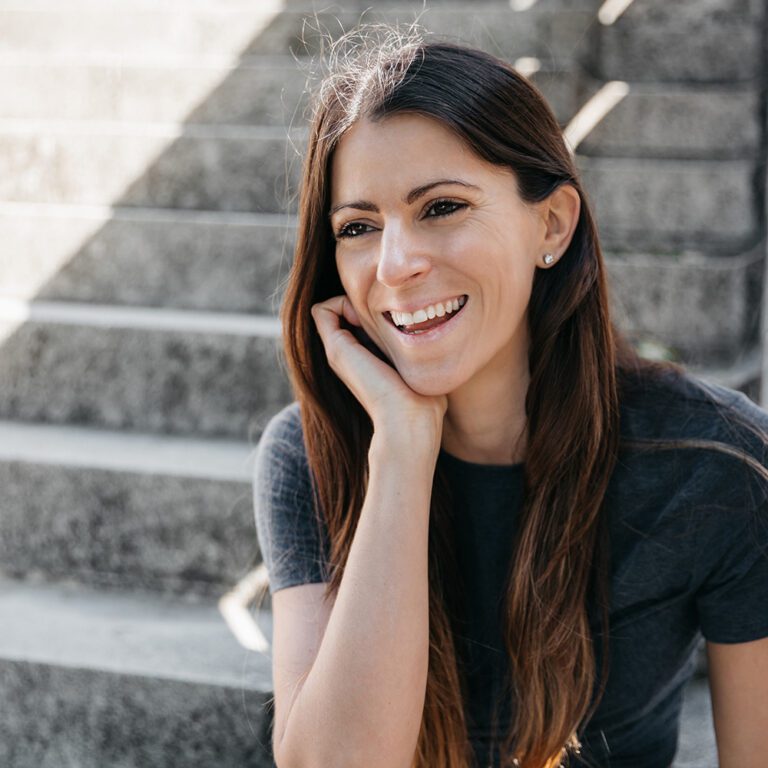
This journal article features an extract from the book “Yoga Happy” by Hannah Barrett releasing in January 2022. Pre-order your copy here.
Register here to get access to FREE Yoga Happy Flow on Wanderlust TV and get a chance to win a copy of Hannah’s Yoga Happy book, and a free month on Wanderlust TV. Or flow with Hannah in a 10-day It Starts at Home Challenge with a 14-day free trial.
Your ‘inner dialogue’ is, simply put, your thoughts. That voice inside that comments on your life, consciously and subconsciously. Yoga helps us recognise our thoughts, find patterns or habits, and study them in order to create freedom from them and thrive in life on all levels.
The fourth niyama is svadhyaya or ‘self-study’ and it’s about knowing our true identity. In the book The Yamas and Niyamas by Deborah Adele, Deborah describes human beings as a diamond ring wrapped in many boxes or layers. These layers are born from our personal experience: our childhood, education, affluence, where we are born and so on, all feed into them. Svadhyaya helps us to understand these layers.
Yoga reminds us that we are the core, not these layers, and part of the idea of self-study is to remind us of our true identity. It helps us understand our layers and why they are there. Doing this in turn helps us to understand why we act or react in a certain way. For example, if your childhood lacked compassion and you were punished for every mistake you made, you may still carry around this experience.

When you or others make a mistake your mind immediately thinks punishment whereas we are human, we make mistakes and punishment shouldn’t be the immediate nor only reaction. We can treat mistakes with empathy, compassion and understanding. There’s a beautiful quote from a poem by thirteenth century Persian poet Rumi that says: ‘Raise your words, not voice. It is rain that grows flowers, not thunder.’
We dive more into this in on pages 114–121 but self-study is a useful concept to keep in mind when we consider the words we think and speak and why certain habits or thought patterns may occur.
In establishing your yoga practice, both on and off the mat, you need to support yourself through positive self-talk, compassion and understanding. This will make it easier to sustain a yoga habit.
If we think of some of the yamas we have talked about already (see page 126), they remind us of this. For example, ahimsa (or non-violence) and finding kindness towards yourself; knowing that maintaining a yoga habit in this modern world is difficult and having empathy for yourself if you’re finding the physical practice challenging, or if you only have three minutes today to stop and breathe.
Satya is truthfulness and can be reflected in a yoga plan that is realistic. How many times have you intended to squeeze everything into your day, allowing no time for breaks or things to come in that weren’t expected? This can result in a sense of failure if we don’t get everything done that we have intended to. In reality, if we had just been truthful and realistic with ourselves at the start of the day, we could have felt the opposite way. So, when you are thinking of a yoga plan, find truth and realistic expectations.
When your inner dialogue is filled with negativity and you continually beat yourself up for even the smallest of infractions, it creates unrest inside you. When I learned how to flip my perspective and change the way I spoke to myself, challenging those negative thoughts and replacing them with kindness, it changed me as a person.
This isn’t just a ‘fake it ‘til you make it’ mentality. It’s not about pretending everything is absolutely amazing (this, too, can result in inner turmoil). It’s more about recognising negative thoughts and feelings and reminding yourself that you have the power to rewrite the narrative and reframe your thoughts. We need to be reminded of what is positive, not just within ourselves, but all around us so that we have the tools to cope when things aren’t so easy.
One thing that has been transformational for me over the past few years is giving myself the love, respect and compassion I would give to a friend (again relating back to ahimsa and nonviolence). Think back to a time when something bad happened – big or small – for which you gave yourself a hard time; perhaps it was forgetting to pick something up, breaking something of value or forgetting a deadline. Think of the way you spoke to yourself, the harsh words you used.
Now think of someone close to you that you love – a partner, a friend, a family member. If they had done the same thing, what would you have said? The answer is probably that you would have had empathy and reminded them that we aren’t robots but in fact humans in a deeply chaotic world. Things go wrong, we forget things, we screw up. But if you are constantly putting yourself down for these things, you can’t grow. What will help you grow is turning that inner voice around and having some understanding about why it happened, and thinking about how you can stop it happening again.
—
 Hannah Barrett is a London-based yoga teacher, empowering students all over the world to feel confident and find strength on the mat. With 400 hours of Yoga Alliance training and a specialization in anatomy, she also has 42-hour pregnancy teacher training and a 75-hour postnatal. Teaching pre and postnatal women is a specialty of Hannah, but she equally enjoys teaching all students to find their fire & strength from within. Her style is dynamic, playful, anatomy-based and challenging but always accessible, with an intention to empower you to create strength, resilience and connection, feel grounded and have fun in the process. She is known for strength-based creative flows with fun and unexpected transitions and modifications to make the flows accessible to all.
Hannah Barrett is a London-based yoga teacher, empowering students all over the world to feel confident and find strength on the mat. With 400 hours of Yoga Alliance training and a specialization in anatomy, she also has 42-hour pregnancy teacher training and a 75-hour postnatal. Teaching pre and postnatal women is a specialty of Hannah, but she equally enjoys teaching all students to find their fire & strength from within. Her style is dynamic, playful, anatomy-based and challenging but always accessible, with an intention to empower you to create strength, resilience and connection, feel grounded and have fun in the process. She is known for strength-based creative flows with fun and unexpected transitions and modifications to make the flows accessible to all.